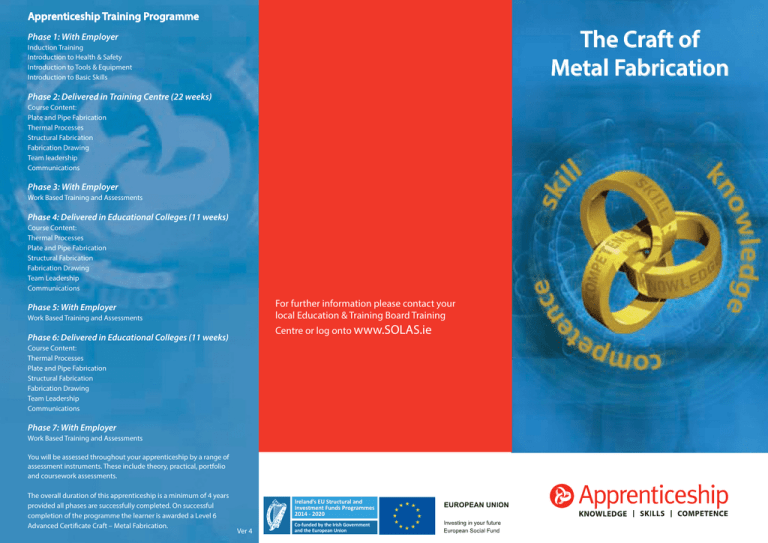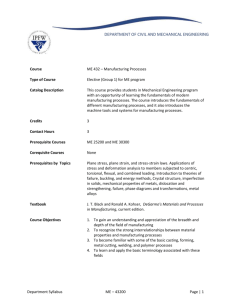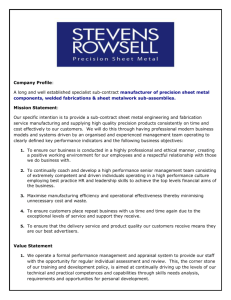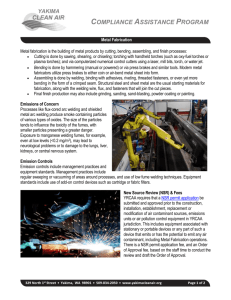The Craft of Metal Fabrication
advertisement

Apprenticeship Training Programme The Craft of Metal Fabrication Phase 1: With Employer Induction Training Introduction to Health & Safety Introduction to Tools & Equipment Introduction to Basic Skills Phase 2: Delivered in Training Centre (22 weeks) Course Content: Plate and Pipe Fabrication Thermal Processes Structural Fabrication Fabrication Drawing Team leadership Communications Phase 3: With Employer Work Based Training and Assessments Phase 4: Delivered in Educational Colleges (11 weeks) Course Content: Thermal Processes Plate and Pipe Fabrication Structural Fabrication Fabrication Drawing Team Leadership Communications For further information please contact your local Education & Training Board Training Phase 5: With Employer Work Based Training and Assessments Centre or log onto www.SOLAS.ie Phase 6: Delivered in Educational Colleges (11 weeks) Course Content: Thermal Processes Plate and Pipe Fabrication Structural Fabrication Fabrication Drawing Team Leadership Communications Phase 7: With Employer Work Based Training and Assessments You will be assessed throughout your apprenticeship by a range of assessment instruments. These include theory, practical, portfolio and coursework assessments. The overall duration of this apprenticeship is a minimum of 4 years provided all phases are successfully completed. On successful completion of the programme the learner is awarded a Level 6 Advanced Certificate Craft – Metal Fabrication. Ireland’s EU Structural and Investment Funds Programmes 2014 - 2020 Ver 4 Co-funded by the Irish Government and the European Union What is a Metal Fabricator? Aspects of work The Metal Fabricator’s work involves the installation and manufacture of a range of metallic systems to include pressure vessels, tank and boiler manufacture, structural steel systems, plate steel systems and piping systems. Metal fabricators can shape steel components with the aid of thermal cutting equipment and a range of machinery used in bending, folding and cutting metal plate and pipe components. Thermal processes such as MMA (Manual Metal Arc) welding, TIG/TAG (Tungsten Inert Gas and Tungsten Active Gas) welding MIG/MAG (Metal Inert Gas and Metal Active Gas welding and oxy acetylene welding and brazing are skills used by the metal fabricator. n Learning and developing new practical craft-related skills, knowledge and competence Metal Fabricators require many skills including: • Working with a variety of specialised hand and power tools • Knowledge of a range of metal fabrication processes • Performing a range of welding processes • Interpreting technical drawings and specifications • Measuring, marking out, cutting and welding mild steel, stainless steel, alloy steels and aluminium plate and pipe • Installation of structural steel systems n Working with and learning from experienced Craftspersons n Seeing a job through from start to finish n Comply with Health and Safety requirements n Using tools and operating machinery nBeing responsible for controlling or adjusting equipment n Demonstrate good analytical and troubleshooting skills n Understanding technical drawings and diagrams n Being well organised and careful with practical tasks n Keeping up to date with changing technologies n Being physically active n Taking responsibility for own learning, including the allocation of study time n Working in a noisy environment nPassing all your phase exams (theory, practicals skills demonstration) How to become an Apprentice n You must obtain employment as an apprentice in your chosen occupation. n The employer must be approved to train apprentices. n The employer must register you as an apprentice within two weeks of recruitment. n In certain crafts, apprenticeship applicants are required to pass a colour vision test approved by SOLAS. Entry Requirements The minimum age at which the employment of an apprentice may commence is 16 years of age. The minimum educational requirements are: 1. Grade D in five subjects in the Department of Education & Skills Junior Certificate Examination or an approved equivalent, or 2. The successful completion of an approved Pre-Apprenticeship course or 3. Three years’ work experience gained over sixteen years of age in a relevant designated industrial activity as SOLAS shall deem acceptable As a Metal Fabricator you will need to be physically active and to be able to work with your hands. An awareness of health and safety and good housekeeping is essential as well as attention to detail. It should be noted that these are the current approved minimum educational requirements for apprenticeship programmes, however, previous experience of the following subjects would be an advantage but not essential: Metalwork, Physics, Engineering, Technology, Mathematics and Technical Drawing/Graphics. The Metal Fabricator must have the ability to: Opportunities on Qualification Personal Qualities and Skills • Plan and organise • Communicate effectively • Solve problems • Work independently and as part of a team • Show a positive attitude • Recognise the need for good customer relations • Demonstrate good work practices including time keeping, tidiness, responsibility, quality awareness and safety awareness nEarning as you learn On successful completion of the apprenticeship programme, apprentices are qualified to work within the recognised trade or profession. Where apprentices and craftspersons have the necessary ability and initiative, opportunities are available for advancement. These include advanced technology courses and management courses which are available in Institutes of Technology, Schools of Management and Professional Institutes. Many apprentices use their apprenticeship qualification as a platform to launch careers such as engineers, managers, owners of businesses, teachers and instructors amongst others.



